These two behemoths of international football have met in two World Cup finals, two quarter-finals and two group matches. Germany have been edging it since 1958 but Argentina pipped them to the trophy in 1986. What next for Argentina v Germany
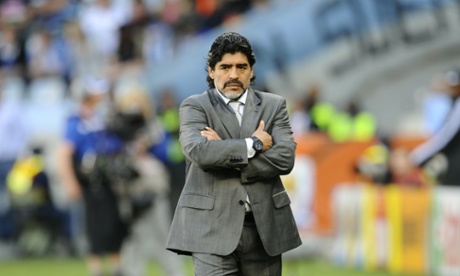
Seventeen of the players involved in that match in Cape Town featured in the semi-finals this week: 10 for Germany (Manuel Neuer, Philipp Lahm, Jerome Boateng, Per Mertesacker, Bastian Schweinsteiger, Sami Khedira, Toni Kroos, Mesut Ozil, Thomas Müller, Miroslav Klose) and seven for Argentina (Sergio Romero, Martín Demichelis, Javier Mascherano, Maxi Rodríguez, Sergio Agüero, Gonzalo Higuaín and Lionel Messi).
As Dominic Fifield reports below, Diego Maradona's team were slaughtered that day. Germany cut through them like a knife would slide through butter that has been left out on a picnic table on a sunny afternoon. They swept forward from all angles to make Argentina 2010 look like Brazil 2014.
Can Argentina make a better fist of it this time round? Lionel Messi will be their hope. Re-reading David Lacey on the 1986 final below, it's clear than Maradona did not win the World Cup on his own. But he did what he had to do for the team to make it through. He scored the goals that beat England in the quarter-finals and Belgium in the semi-finals, and then he played his part in the final.
Lacey reported that Maradona "stayed in the engine-room, checking on the gauges and the pistons and giving a less spectacular through no less valuable performance". Messi might need to offer his team some more firepower on Sunday night, but at least Maradona isn't in charge of Argentina's tactics this time round.
Germany 4-0 Argentina, 2010 World Cup quarter-final
Germany dump Diego Maradona and Argentina out
By Dominic Fifield, Green Point Stadium, 3 July 2010
If it had indeed been the will of God that Argentina should claim this World Cup, then Diego Maradona must feel utterly abandoned now. Germany's staggering and irresistible progress through this tournament has propelled them yet a gain beyond fancied opposition. This was a slaughter to leave El Diego numbed and close to tears on the touchline. His dream has died.
He may concede this to have been another jaw-dropping master-class in incisive counterattacking football with which Argentina could not compete. Joachim Löw's team may have lacked the star names of their South American rivals, but they were always the more dangerous side here, with the scoreline, even at 4-0, anything but flattering. Youthful zest combines with purring ability and tactical discipline in their approach. After this victory, Germany will be undaunted at the prospect of playing either Paraguay or even Spain in the semi-finals. The momentum and conviction is all theirs.
In Bastian Schweinsteiger they boasted this contest's most dominant force, his personal display summed up by his contribution to Germany's third goal as he bustled beyond Angel Di María, Javier Pastore and Gonzalo Higuaín's half-hearted challenges before pulling back for Arne Friedrich to bundle home. Michael Ballack, the absent Germany captain, leapt in celebration in the stands. In the veteran's absence, this side is outmanoeuvring all-comers. They appear unstoppable.
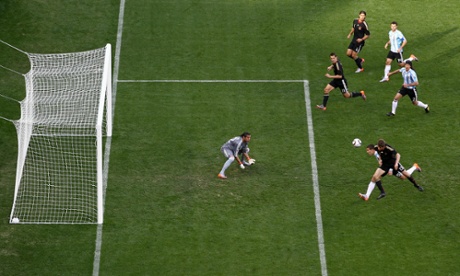
The Germans had picked up where they left off against England, their slick exchanges sweeping downfield as Argentinian players gasped in their vapour trails. Philipp Lahm was a blur of energy down the right, a permanent outlet for team-mates to spread the play. Lukas Podolski was just as energetic down the opposite flank and, even if Mesut Ozil flitted in and out of the contest in his free role, Schweinsteiger set the side's rhythm and dominated central midfield.
The Bayern Munich midfielder was authoritative where Javier Mascherano could only appear flustered. It was Schweinsteiger's early free-kick, conceded after Nicolás Otamendi's late lunge on Podolski, that was flicked in by Müller who had slipped away from the right-back to glance a header through Sergio Romero. Maradona was all animated frustration though, at the interval, he may have been relieved. The Germans should have added a second while Argentina dawdled, Miroslav Klose skying over a shot from an unchallenged position near the penalty spot after Gabriel Heinze's error and Müller's pull-back.
The menace had been all German, the South Americans' anxiety prompting a huddle just inside the mouth of the tunnel as they sought urgency with the intrusive television cameras shoved away by Martín Demichelis. That briefly spurred them on, Lionel Messi and Carlos Tevez upping their tempo in a bid to undermine the German back line, though Löw's side were happy to let their opponents ping their passes at arm's length with little space behind for the tricky forwards to exploit.
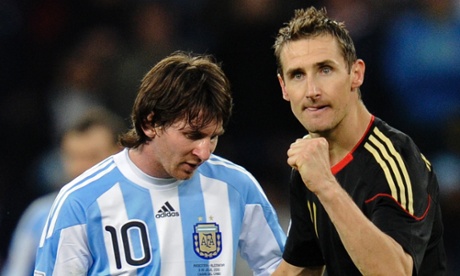
The chances created were ambitious rather than truly threatening, Manuel Neuer claiming from Higuaín, Tevez and Di María with the winger battering beyond the far post when he did beat the goalkeeper. Yet, as their desperation grew, so too did Germany's threat on the break. A ramshackle back line was duly pierced for a second time as the grounded Müller conjured a hooked pass to liberate Podolski, with his centre beyond Nicolás Burdisso tapped into the gaping net by Klose.
Thereafter, this took on the appearance of a rout with Friedrich's third followed in the dying seconds by Klose's 52nd international goal on his 100th appearance. Messi, in contrast, ended this tournament goalless. As Argentina lament, so Germany dare to dream.
Argentina: Romero, Demichelis, Burdisso, Heinze, Otamendi, (Pastore, 70), Di Maria (Aguero, 76), Mascherano, Maxi, Higuain, Messi, Tevez.
Germany: Neuer, Friedrich, Lahm, Mertesacker, Boateng (Jansen, 72), Khedira (Kroos, 78), Schweinsteiger, Ozil, Podolski, Klose, Müller (Trochowski, 83).
West Germany 1-0 Germany, 1990 World Cup final
Argentina finally punished by West Germany
By David Lacey, Stadio Olimpico, 8 July 1990
The West Germans won the World Cup for the third time last night and Rome has a new Emperor, Franz Beckenbauer, who led his team back from their disappointment of losing to Argentina in the 1986 final and enabled them to enjoy the triumphant moment he had experienced as a player in captaining the national team to success in the 1974 tournament.
West Germany deserved their success because from the beginning of the 1990 World Cup they had played fast, open attacking football and consistently achieved more penetration than any of their rivals.
Beckenbauer can now retire from the post of West German team chief, which he accepted reluctantly six years ago, with honour. In taking the Germans to two successive finals and winning the second he has re-established the chain of command broken by the abrupt departure of Jupp Derwall after the European Championship failures of 1984. Now Berti Vogts, the Kaiser's batman, can take over with confidence.
What a pity last night's final failed so completely to match the winners' overall achievement. The success may have been imperial but the game was plebeian for the most part and ended in near-anarchy.
After defending dully but solidly Argentina were beaten by a penalty which typified the indifferent refereeing of the tournament as a whole and ended with nine men on the field after Edgardo Codesal had sent off Pedro Monzón, the first man ever to be dismissed in a World Cup final, and Gustavo Dezotti.
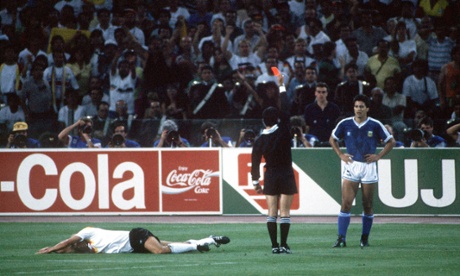
The tournament that was supposed to eradicate cynical fouls and general unpleasantness ended with Codesal surrounded by protesting losers. Diego Maradona, his World Cup career over, sat quietly away from the hubbub, no doubt contemplating the contrast between last night's denouement and his joyous moment four years earlier when he had inspired a rather better Argentinian team to victory over the Germans in a far superior game of football.
It has been even harder to love the Argentinians this time. They came to the final with a long list of previous convictions, having committed more fouls (152) and received more cautions (19) than any other team in the tournament.
Maradona himself had been fouled 48 times but was never going to get any sympathy because people remembered his crafty handball against the Soviet Union in Naples and had grown weary of the agonising, the grimaces and the constant appeals to the Deity. The Olympic Stadium loathed Maradona last night and the loathing was shrill and long. It was like Orwell's Two-minute Hate, often repeated.
Sadly, because he has been one of the game's outstanding talents, but fittingly too, he ended his last World Cup final with a yellow card for one last argument, this on behalf of Dezotti whose dismissal for grabbing Kohler round the neck three minutes from the end and wrestling him to the ground was a bit hard.
By then, however, Codesal had almost lost control of the game, such was the strength of Argentinian feeling on the subject of the penalty with which Andreas Brehme won the cup for the West Germans.
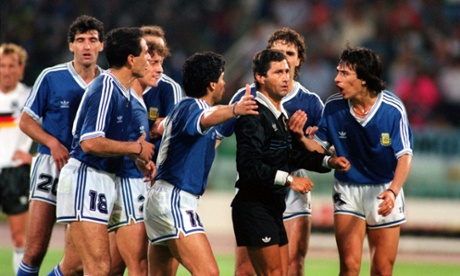
In the 84th minute Calderon, the other Argentinian substitute, appeared to have reasonable claims for a penalty as he had a leg hooked away on the corner of the German area. But play continued, the Germans broke away quickly and in the next instant Sensini and Voller were closing in on each other at the other end.
Sensini appeared to go for the ball. Certainly there appeared to be no intention of taking the man, because the defender had time and the danger was not acute. But Voller went down over Sensini's lunge, the penalty was given and Brehme calmly stroked the ball past Goycochea's right hand.
The fury of Argentina's reaction to the decision stemmed from the belief that even with 10 men, after the dismissal of Monzon in the 64th minute, they were still capable of forcing extra-time and another penalty competition, the winning of which had taken them through both the quarter-finals and the semi-finals.
Dull though this ambition was, it had something to do with the fact that the holders began the final with four players unavailable through suspension, including Claudio Caniggia, the one forward with the speed to unsettle the German defence. Dezotti was not in Caniggia's class and while Burruchaga offered the occasional threat Maradona, closely marked by Buchwald, was rarely an influence.
Bereft of Caniggia and surrounded by 70,000-odd Caligulas, Argentina defended with good discipline until Monzon caught Klinsmann with a dreadful hack above the knee after the German striker had gathered a return pass from Matthaus and was starting to accelerate on the right wing.
Monzon, who had only been on the field for 15 minutes, had to go, but Voller, who had already been cautioned for a foul on Maradona, was lucky to stay on the field after catching the same player in the face with a wayward elbow. The referee ignored Maradona's complaints the penalty of crying wolf too often.
The West Germans showed only a few glimpses of the drive, pace and power that had excited the Milanese crowds in the early rounds. Little Thomas Hassler was their busiest player, always searching for space in the crowded areas near the Argentinian goal, and Pierre Littbarski produced the game's one outstanding individual moment when he swerved past three defenders early in the second half before shooting wide.
Matthaus's contribution was solid rather than inspirational and for much of the game the Germans relied on free-kicks and centres, especially when they were provided by Brehme, for their scoring chances. Voller often managed to get on the end of these but his finishing was wayward.
Before the penalty Augenthaler wasted West Germany 's best chance. Matthaus's searching centre from the right found him in space in the penalty area with only Goycochea barring the way, but the sweeper's first touch was poor and enabled the goalkeeper to avert the danger with his legs, over which Augenthaler then threw himself, vainly appealing for a penalty.
The match disintegrated after that. Cautious, crabby and a poor spectacle, it typified the way much of the tournament had gone. The World Cup began with Argentina losing to Cameroon, who finished with nine men on the field, and ended with the holders relinquishing the trophy after being similarly reduced in numbers by red cards. There must be a better way of playing football.
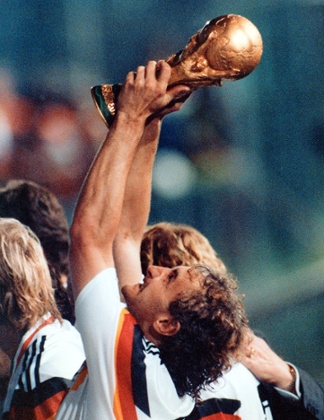
Argentina: Goycochea Basualdo, Lorenzo, Simon, Serrizuela, Ruggeri (Monzon 45), Burruchaga (Calderon 53), Sensini, Dezotti, Maradona, Troglio.
West Germany: Illgner Berthold, Brehme, Kohler, Augenthaler, Buchwald, Littbarski, Hassler, Voller, Matthaus, Klinsmann.
Referee: E Codesal (Mexico).
Argentina 3-2 Germany, 1986 World Cup final
Argentina on top of the world again
David Lacey, Aztec Stadium, 29 June 1986
Argentina won the World Cup for the second time in three tournaments yesterday by proving that there is more to their team that Diego Maradona. They defeated West Germany 3-2 in the Aztec Stadium in Mexico City in a final which saved its main dramas for the last 16 minutes and then left the capacity crowd limp with excitement. It was a climax the 1986 World Cup deserved.
To West Germany must go the credit for transforming a predictable and at times prosaic game into a memorable match. They were two goals down before the hour and seemed destined to pass into footballing history as the most uninspired of losing World Cup finalists.
In this sort of situation, however, something always seems to stir in the soul of the most leaden-footed West Germany footballer. They had proved as much, to England's cost, in Mexico 16 years earlier.
Or perhaps it is that more than most teams they remember all too well that a football match lasts at least 90 minutes. Whatever the truth of the matter, two corners from Andreas Brehme were sufficient to produce goals which brought the scores level in the space of nine minutes, and just for a moment it seemed that the World Cup was going to be taken back to Europe from a Latin American tournament for the first time in the most extraordinary fashion.
Then, with an uncanny echo of the 1979 FA Cup final, when Manchester United had recovered in similar fashion to draw level with Arsenal at 2-2, the coolest head on the field swung the match back on to its original course.
At Wembley on that day it had been Liam Brady laying on the winner for Alan Sunderland to take the prize to Highbury. Now Maradona's simple but well-timed pass over the halfway line caught the Germans fully committed to attack and left Burruchaga with a clear run towards Schumacher. Burruchaga gave the German goalkeeper no chance – not even the chance to occasion him bodily harm – and so the World Cup went back to Buenos Aires instead of across the Atlantic to Frankfurt.
It was the obvious and the fairest result even if the final double twist to the plot had left the outcome briefly in doubt. It was fitting too that the most decisive blow should be struck by Burruchaga, who on the day was best cast for the role of West Germany's executioner.
Maradona, whose explosions of individual skill against England and Belgium had carried him to the final of a wave of universal acclaim – give or take the odd English cry of "Cheat" – stayed in the engine-room yesterday, checking on the gauges and the pistons and giving a less spectacular through no less valuable performance.
The argument that Argentina amounted to nothing more than Maradona and 10 journeymen always did look thin but it needed yesterday's performance to convince the sceptics of their true worth as world champions.
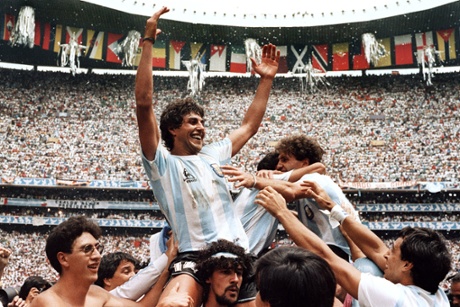
Burruchaga had an exceptional game as did the rest of the Argentina midfield with Héctor Enrique, Julio Olarticoechea and Ricardo Giusti not far behind. Their ability to pressurise the Germans whenever possession was lost, fall back to broaden the defensive barrier, then break out swiftly and incisively once the ball had been regained enabled them to take a grip on the match which West Germany seldom challenged until that last chaotic quarter of an hour.
The Germans approached the game with their usual phlegmatic sense of discipline and organisation, preferring Thomas Berthold to Wolfgang Rolff to give them extra width, pace and penetration on the right. But until they scored there was little imagination in their football. Karlheinz Förster had an excellent match in the middle of the defence but Felix Magath and Norbert Eder were consistently outnumbered in midfield and Matthaeus's duties in staying goalside of Maradona prevented him from supporting attacks in his usual way.
Not that Maradona made an immediate impact. Indeed, the first time he came to the attention was in the 19th minute when he was cautioned after throwing a tantrum when the referee ordered a German free-kick to be retaken because the defensive wall had not retreated the proper distance.
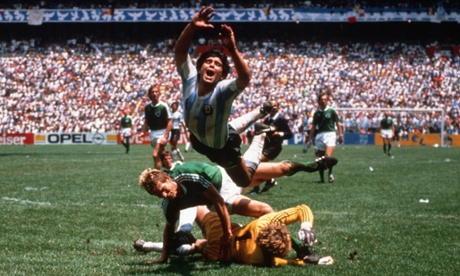
Three minutes later Matthaeus was cautioned for a crude tackle on Maradona and in the next instant the tension which had been building up in Argentina's play was eased by their first goal.
Burruchaga's free-kick from the right swung away from Schumacher who was left punching thin air as Brown headed the simplest of goals at the far post. After the way they had defended throughout the tournament it was a remarkably elementary way for the West Germans to fall behind.
They had a few chances of drawing level before half time although Rummenigge would probably have scored after Berthold had nodded a free-kick black to him from the far post.
For the second half Franz Beckenbauer, the West German coach, replaced the struggling Allofs with Voeller but the change made little immediate difference to the game's pattern except that as the Germans lumbered forward in greater numbers they were more likely to be caught thinly covered at the back. This is precisely what happened in the 56th minute when Argentina scored their second goal.
One tight turn by Maradona near the centre-circle was enough to expose West Germany completely on the left. Maradona foung Enrique who in turn set Valdano free on the wing. Cool finishing has not been Valdano's forte in this World Cup but now he calmly drew Schumacher off his line and slipped the ball past him inside the far post.
Beckenbauer promptly took off his draftsman, Magath, and brought on the old battering ram, Hoeness, who in the past had rescued the Germans from such fraught situations.
In the event Brehmen's corners from the left did the trick. Voeller met the first with a header at the near post which might have been miscued but still set up the chance for Rummenigge snatched with his old voracity.
That was in the 74th minute. Then, in the 82nd, Brehme swung his corner to the far post and this time Berthold's head reached the ball before the Argentina defence for Voeller to bring the scores level.
The rest happened so suddenly that the supporters of West Germany and Argentina were, still, in turn, rejoicing and despairing before they had realised what happened.
The final whistle saw the stadium enveloped in silver streamers as Maradona collected Argentina's golden prize. For Carlos Bilardo, the Argentina manager, the moment was a culmination of three and a half years' patient rebuilding of their squad in which his prime task was to marry the outstanding talents of Maradona with the newer players coming through. This tournament had borne evidence to Bilardo's success in that direction.
France might have had more style and Brazil more ebullience but Argentina came to Mexico with one exceptional player backed by ever-improving teamwork – and yesterday the gained their rightful reward.
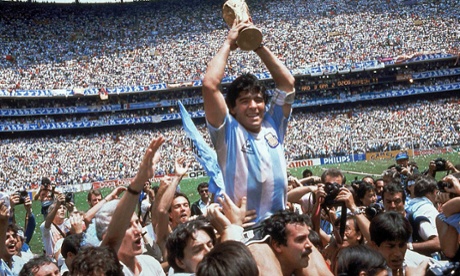
അഭിപ്രായങ്ങളൊന്നുമില്ല:
ഒരു അഭിപ്രായം പോസ്റ്റ് ചെയ്യൂ
KICKERKICKOFF give everything about football